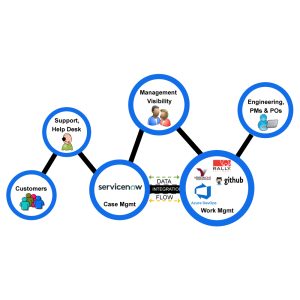Our dedication to collaborating with a wide range of clients on their data management endeavors continues to be a driving factor, inspiring us to reach greater heights with our solutions. The recently published The Forrester Wave™: Data Management for Analytics, Q1 2023 reaffirms that our concerted efforts to aggressively enhance our data management offering are bearing fruit. This data management dynamically and intelligently orchestrates governed data across distributed landscapes, providing a common foundation for data consumers.
With IBM Cloud Pak for Data and Analytics offerings, you gain the ability to compose and re-use data services, addressing a wide range of use cases, including data integration, data governance, AI governance, and data science and MLOps. This comprehensive automation maximizes productivity and time-to-value through automated policy enforcement and business controls while leaving data in its original location. Let’s delve into IBM’s approach and its strengths highlighted in the Forrester Wave.
- Tailored for Large and Complex Environments: IBM’s technology excels in handling large, complex, and distributed data stores across hybrid and multi-cloud environments, even incorporating legacy systems. This capability is pivotal in enabling organizations to streamline complex operations while accommodating existing infrastructure.
- Data Governance: IBM’s data management offers robust governance capabilities. It automatically applies metadata to new datasets using machine learning, generates data quality assessments and scores, and provides AI-based dataset recommendations. This semantic approach to technical data assets accelerates business understanding and enables self-service. Dynamic masking, automatic policy enforcement, and sensitive data recognition ensure data remains in the right hands without compromising its value. Centralized enforcement of policy and business controls strengthens data governance and privacy.
- Data Governance: IBM’s data management offers robust governance capabilities. It automatically applies metadata to new datasets using machine learning, generates data quality assessments and scores, and provides AI-based dataset recommendations. This semantic approach to technical data assets accelerates business understanding and enables self-service. Dynamic masking, automatic policy enforcement, and sensitive data recognition ensure data remains in the right hands without compromising its value. Centralized enforcement of policy and business controls strengthens data governance and privacy.
- Data Pipeline and Trustworthy AI: Bridging the gap between data availability and its utilization for analysis and AI is challenging but vital. IBM’s data management addresses this challenge by offering various data integration styles, such as ETL and ELT, data replication, change data capture, and data virtualization. Components like advanced data engineering automate data access and sharing while accelerating data delivery with active metadata. This approach fosters trust in models and deployment, with automated tools for data cleaning and preparation. Users can efficiently build, deploy, scale, and train models, and automated monitoring and retraining prevent model degradation, drift, and bias.
- Transaction Processing: Leveraging the legacy of IBM Db2, the transaction processing capabilities of IBM’s data management are built upon a solid foundation. Data integration styles and additional features, like automatic workload balancing and elastic scaling, ensure seamless operations even under high data volumes. Zero-downtime data migration and upgrades guarantee uninterrupted transaction processing.
- Flexible Deployment Options: IBM’s data management emphasizes flexibility in solution architecture. Clients can choose from a wide array of deployment options, from fully managed by IBM to self-managed on-premises solutions. Cloud vendor options, including AWS and Azure, provide further choices. Clients retain the decision-making power to select specific data management components, avoiding the constraints of a one-size-fits-all approach.



